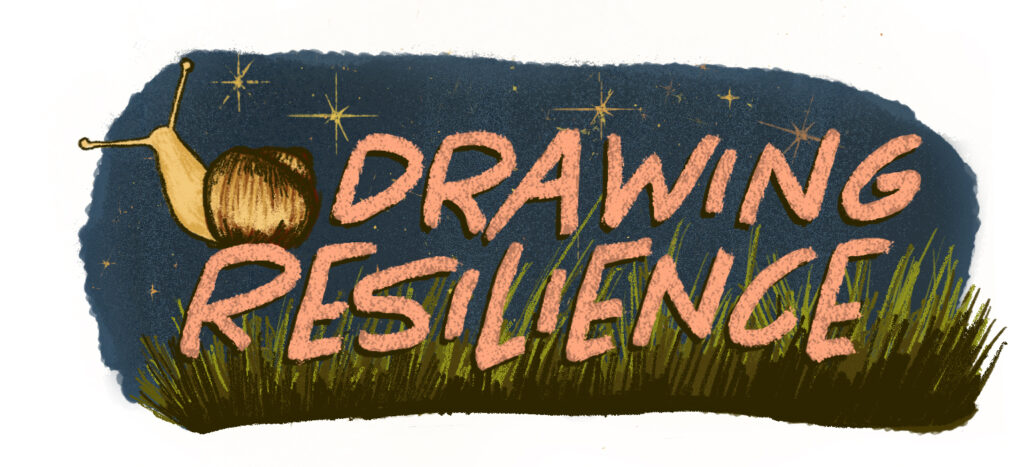
Drawing Resilience: Hannah Evans

Illustrations and interview by Nhatt Nichols
Hannah Evans is the former Executive director of Virginia Food Works, a nonprofit that helps farmers and small businesses can their produce and create value-added products like salsa, hot sauce, and pasta sauce.
VFW works closely with the Prince Edward County canning facility to provide their services. The canning facility is used the rest of the time by local people who want to preserve food through canning. Though county-run canning facilities were once common, the Prince Edward County cannery is one of the few left in the country that is thriving. (You can read my 2022 piece about the facility in the Daily Yonder.)
I spoke with Hannah just before she stepped down as executive director of Virginia Food Works. She plans on staying on as a volunteer board member and hopes to have more time to use her research in folklore to tell stories about the importance of their work. She also plans on spending more time with her kids, teaching the next generation the importance of growing and preserving food.
Nhatt:
There’s nothing more resilient than encouraging people to preserve food! Can you talk about Virgina Food Works and your role there?
Hannah:
The home canning side of things, which Prince Edward County runs, has access to the cannery on Monday, Tuesday, and Wednesday, primarily in the mornings. In the commercial branch, our primary days are Thursdays and Fridays. But there’s a lot of collaboration, and we work closely together. Our offseason is from June to December when an average home canner will have the most produce. And then their offseason is from January through June.
Nhatt:
Not as many things growing in a back garden in the winter and early spring would want to be canned.
Hannah:
Versus for us, who have a lot of small businesses that use produce that is not sourced locally or store up their seconds produce in freezers and then make products with leftover berries or tomatoes from the previous season. It’s easier for them to do that in those January through June months when they’re not harvesting.
Nhatt:
Are you seeing a lot of small local farms finding ways to bring value-added products year-round, and that’s the main type of community you’re supporting?
Hannah:
Our two primary businesses are either small farmers trying to figure out how to get value out of their second produce or their leftovers from previous seasons.
The second major group we work with is small food entrepreneurs. These are farmers’ markets or small food businesses with some sort of heirloom product. We see a lot of ethnicities coming in, Indian or Nigerian food products, who may have come to the US and found no options for buying food that reminds them of home. People in their communities are saying, Hey, you guys should sell this because this is amazing, and we don’t have access to stuff like this here.
Or it’s different kinds of hot sauce and barbecue sauce companies, where someone’s been making this recipe for years, and people are like, Oh, my gosh, you need to try to sell this.
They’re trying to break into the food space, and because we’re so small, we’re able to do that without having minimum capacities, whereas any other kind of co-packer is going to have a minimum of a couple 100 gallons or need you to invest a lot of capital upfront.
Nhatt:
I love that you’re also building cultural resiliency. Bringing in different communities and giving them access in ways that wouldn’t typically be available feels like it would be healing.
Hannah:
I love that part of the process. It’s been really sweet to help growers in our community, throughout Virginia, and surrounding states. Cultures of all kinds have been able to come in and use our facility.
Nhatt:
Other municipal canning facilities are failing because they need more interested people. But you have managed to tap into something that fosters community and business. Why is it working here where it isn’t working in other places?
Hannah:
It’s an unfortunate truth, but it’s just money. We can do it because Prince Edward County helps subsidize us; they have chosen to pour county funds into this incredible resource. They subsidize the home canning side of things because that’s an entirely county-run enterprise, but they also provide a stipend to Virginia Food Works and help us apply for grants.
Any other nonprofit in this situation would have to pay exorbitant rent fees; being in a rural community also helps.
Nhatt:
The community I live in has a lot of farms trying value-added products to make farming economically feasible. Farmers have difficulty finding workers because potential workers can’t find housing; they have to be more efficient because they can’t hire anyone.
Hannah:
I think that’s such a difficult part, too.
I remember our founder was talking to food banks about produce from local farmers that might go to waste because they don’t have the manpower to pick the second round in the field. It ended up being way more expensive, even if we donated the canning time and received the tomatoes for free because of the cost of running the facility and buying the jars. It was less money for a food pantry to buy canned tomatoes from a major food company than it would cost for the cans for us to do it. And so food goes to waste.
Get this and other rural content in your inbox with the Rural Assembly newsletter.







